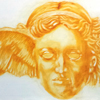
Dance For Kali: A Review
Kali Time Pagan Art Without the Pentagram
Pagan Art Without the Pentagram
Goddess Kali Time, Posted by Steven Posch on Tuesday, 04 November 2014 in Culture Blogs

Anyone who thinks of contemporary pagan art as the preserve of the fey, the twee, or the technically improficient needs to get his (or her) butt down to the Minneapolis Collective of Pagan Artists’ Samhain 2014 exhibit, Doorways to the Underworld, stat. There she (or he) will encounter confident, conceptually mature work by artists fully in command of their respective media. All this without pentagrams. Well, there’s one, but on that, more later.
Anglo-American painter Roger Williamson’s A Dance for Kali is indisputably one of the stars of the show. In Williamson’s previous work we frequently see figures emerging out of a dark surround: an inversion of the gold grund of Eastern Orthodox iconography, but working on the same principle. In Dance we encounter three simultaneous visual fields. In the far back—as it were, in the deep past—swirling darkness; in the middle ground, a hovering neon Kali yantra, and before it, the apex of the visual cone, the dancing Kali herself. Or is it Kali?
With her halo of flying, flaming hair and marble skin, this could be some naked Irish battle-goddess that we see in the midst of her terrible dance, a Nemain or a Morrigan. Williamson shows us here a Western Kali, an emergent visual tradition pioneered by (among others) fellow collective-member Paul B. Rucker. This mad dancer with her impossible necklace of ricocheting skulls simultaneously raises the much-vexed issue of cultural appropriation and tramples it underfoot as irrelevant. How dare we think such a Power culture-bound?

Leave a comment